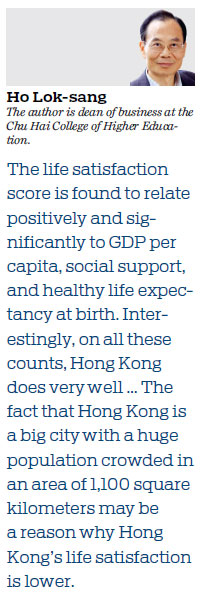Just how happy are people in our city?
Updated: 2019-03-26 05:56
(HK Edition)
|
|||||||
Ho Lok-sang notes HK's life satisfaction score has improved in World Happiness Report since 2005-08 in spite of its persistently low ranking
The 2019 World Happiness Report published by the United Nations Sustainable Development Solutions Network was released last week. It reported on the happiness status of 156 countries or territories. The reading on Hong Kong is not that encouraging, but it is not all gloomy either.

Generally, the key score about life satisfaction that is reported for Hong Kong is much lower than what I found from my own surveys based on random telephone calls. I have not been able to find the questionnaire used in the survey. I would be very grateful if someone would advise me how I can gain access to the questionnaire. In particular, the way the actual questions are asked in Cantonese will affect the results. As younger adults tend to report lower happiness, it is important to avoid over-representing them in calculating the final happiness score, when they are over-represented in the sample relative to the Hong Kong population.
The Life Satisfaction Score for 2016-18 stands at 5.430 for Hong Kong (on a scale 0 to 10). This is noticeably lower than that of 6.262 for Singapore. Generally, in my own studies, I collected readings on three measures of subjective well-being. One is a "happiness index", based on "Taking everything together how happy are you, if 10 is the most happy, and 0 is the least happy." The second is a "total life satisfaction index", based on "Taking everything together, how would you rate your overall life satisfaction, if 10 is the most satisfied, and 0 is the least satisfied." The third is the "is life worth living" index, based on "How would you agree with the statement that life is worth living, if 10 is fully agree, and 0 is totally disagree". Generally the "life worth living" question will elicit the highest reading, the "total life satisfaction" question the lowest, while the "happiness question is in the middle. Generally our happiness reading for Hong Kong is in the region of 6.8 to 7.1 over the years. The total life satisfaction ranges from 6.3 to 6.5. The worthy life index ranges from 7.2 to 7.3.
Generally, people can be happy without being satisfied, because there is always something in life that is not totally satisfactory, and people can also find life worth living without necessarily calling themselves happy, because they find meaning in life.
I write this column not to discredit the UN report, which is directed by three well known economists, John Helliwell, Richard Layard, and Jeffrey Sachs. As a matter of fact, Table 2.1 in the report suggests there is considerable rigor in their results. The life satisfaction score is found to relate positively and significantly to GDP per capita, social support, and healthy life expectancy at birth. Interestingly, on all these counts, Hong Kong does very well. Hong Kong ranks among the top in GDP per capita and is at the top in healthy life expectancy at birth. From what I know, social support is quite strong in Hong Kong too. The life satisfaction score is negatively related to perception of corruption and the SAR also ranks among the top in absence of corruption. For all these reasons, Hong Kong's relatively low ranking, at 76th among 156 jurisdictions, is surprising.
There is some good news about Hong Kong's happiness in the report. It is that the life satisfaction score has shown improvement since 2005-08. The rise is 0.10 points. The Chinese mainland, happily, has experienced a rise of 0.426 points. In contrast, Singapore experienced a decline of 0.379 points, and the United States has experienced a decline of 0.446 points.
Another positive finding about our city is that Hong Kong residents are more generous than many of its peers. Some 60.4 percent of Hong Kong respondents reported having donated to charities in the past month. This is higher than the 49.8 percent in Singapore or 40.7 percent in Taiwan. However, Hong Kong people reported somewhat less volunteering than Singaporeans or Taiwanese. This may, however, be due to Hong Kong's longer hours of work.
The fact that Hong Kong is a big city with a huge population crowded in an area of 1,100 square kilometers may be a reason why Hong Kong's life satisfaction is lower. I have come across studies in the United States, in Canada, and in Australia that all conclude that people living in big cities tend to be less happy. Paradoxically, even though the physical distance between people is shorter in big cities, as you would easily bump into another person walking in the street, the emotional distance between people may be longer. Because you do not see too many people in a small village, you relate better to people. There is more trust, and less conflict.
The 2019 World Happiness Report has one full chapter on "The Sad State of Happiness in the United States and the Role of Digital Media". It found that especially among adolescents, more and more time is being spent on digital media, at the expense of almost everything else, including sleep and interpersonal social interactions. This was cited as a possible reason for the decline in happiness in the US, and one that we should take note of.
(HK Edition 03/26/2019 page8)